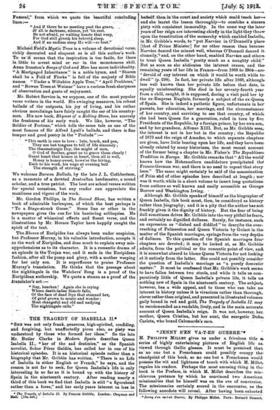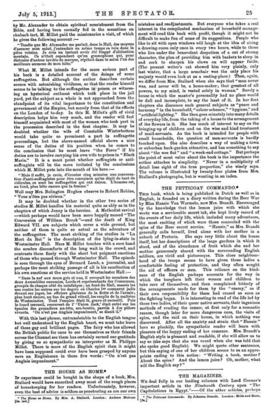"JENNY S'EN VA-T-EN GUERRE."*'
M. PHILIPPE MILLET gives us under a frivolous title as series of highly entertaining pictures of English life aa. viewed through Gallic glasses. It must be premised than as no one but a Frenchman could possibly occupy the- standpoint of this book, so no one but a Frenchman would possess the wit and lightness of touch with which M. Millet, regales his readers. Perhaps the most amusing thing in theā¢ book is the Preface, in which M. Millet describes the mis- chievous pretence by which he convinced two American missionaries that he himself was on the ere of conversion. The missionaries certainly scored in the encounter, as the following anecdote will reveal. After having been exhorted
by Mr. Alexander to obtain spiritual nourishment from the Bible, and having been carnally fed in the meantime on rhubarb tart, M. Millet paid. the missionaries a visit, of which he gives the following account :ā
" Tandis pie Mr. Alexander me parlait, dans le Hall, des moyens d'assurer mon saint, j'entendais en meme temps sa voix dans la piece voisine. Je erns an instant avoir etc frappe d'alienation mentale. Ce n'etait cependant Tenn gramophone qui, pour distraire d'autres invites de marque, repetait dans le salon run des meilleurs sermons de mon hote.'
What M. Millet intends for the more serious part of his book is a detailed account of the doings of some suffragettes. But although the author describes certain scenes with astonishing vividness, so that the reader himself seems to be talking to the suffragettes in prison or witness- ing an hysterical outburst which took place in the jail
yard, yet the subject as a whole is not approached from the standpoint of its vital importance to the constitution and
government of the Empire, but merely from that of its effects on the London of to-day. In this M. Millet's gift of vivid description helps him very much, and the reader will feel himself acquainted with most of the women who took part in the procession described in the first chapter. It may be doubted whether the wife of Constable Winterbottom would take quite so prominent a part in suffragette proceedings, but the above-named official shows a nice sense of the duties of his position when he comes to the conclusion that he must leave "the Force" if his duties are to involve carrying his own wife to prison in "Black Maria." It is a moot point whether suffragists or anti- suffragists will be the more irritated by the conclusions which M. Millet puts into the mouth of his hero :ā
"Mais it suit, je crois, d'ecouter (ring minutes une conversa- tion d'anti-suffragistes pour etre convainen qu'en depit de tant de ridicules, ce Font les suffragettes qui out raison. L'homme eat, an fond, plus bete encore que la femme."
Well may Mrs. Bolington Hughes observe to Robert Robins, " Vous n'etes pas serieux."
It may be doubted whether in the other two series of studies M. Millet handles his material quite as ably as in the chapters of which Jenny is the heroine. A Methodist revival āwhich perhaps would have been more happily named " The Conversion of William Brook "āand the death of King Edward VII. are subjects which cover a wide ground, but neither of them is quite so actual as the adventure of the suffragettes. The most striking of the studies in "La Mort du Roi " is the description of the lying-in-state in Westminster Hall. Here M. Millet touches with a sure hand the sombre discomforts of the long wait in the crowd, and contrasts them finely with the short but poignant emotions of those who passed through Westminster Hall. The episode is seen through the eyes of Bernard Lamb, a journalist, and perhaps the most striking passage of all is his recollection of his own emotions at the service held in Westminster Hall :-
"Dana la nef any murs grin et nus, it revoyait les membres des dean Assemblees ennemies, Lords et representants des Communes, group& de chaque We du catafalque ; an fond du Hall, masses les sins contre les autres sur les degres oil Charles Ier eomparnt jadis (levant ses juges, lea officiers generaux de la flotte et de rarmee ; plus haut encore, an bas du grand vitrail, les surplis de la mattriso de Westminster. Tout rempire &sit 11, grave et recueilli. Puffs le lourd cercueil, reconvert de 1"Union Jack,' etait entre sur les epaules des grenadiers nu-tete, arc-boutes, pareils 1 dis piliers vivants. 'On n'est pas Anglais impunement,' se disait il."
With this last phrase, untranslatable to the English tongue but well understood by the English heart, we must take leave of these gay and brilliant pages. The fairy who has allowed the British public for once to see themselves as their friends across the Channel see them has certainly earned our gratitude by giving us so sympathetic an interpreter as M. Philippe Millet. There is more of the English spirit than it might have been supposed could ever have been grasped by anyone save an Englishman in these five words : " On n'est pas Anglais impunement."



















































 Previous page
Previous page